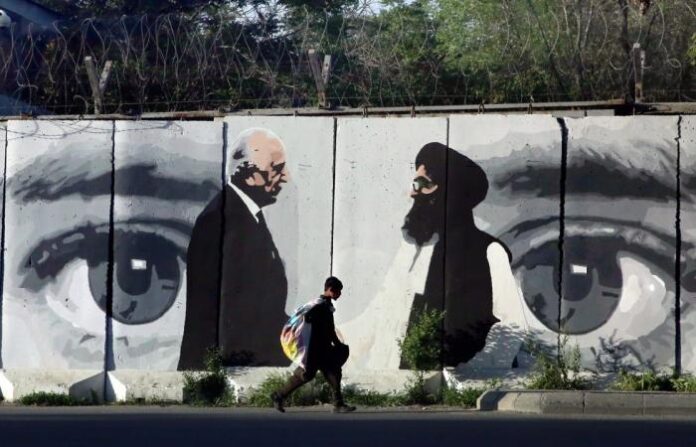Blast walls adorned with various murals in tribute to individuals and pop art are being painted over by the Taliban.
Kabul – For years, Kabul’s forboding concrete blast walls were adorned with images decrying corruption, dedications to fallen journalists, portraits of iconic musicians and pop art depictions of children transporting hearts in place of buckets of water.
Over the last four days though, those images have been whitewashed as the Taliban slowly paints over each one with textual messages of national unity, praise for the mujahideen, as they refer to their forces, and declarations of triumph against the 20-year US occupation of Afghanistan.
Bright, colourful images have been replaced with austere black-and-white text, saying the Taliban “are your brothers and sons, they are the protectors of this land and people”.
To Afghans who lived through it, this phenomenon harkens back to the Taliban’s original rule from 1996 to 2001 when the group banned images of people and animals.
Jawed, who would only give his first name for security reasons, is one of the artists who have been commissioned by the Taliban to paint over the portraits of a member of the nation’s Sikh community who was killed in a 2018 bombing and Tetsu Nakamura, the Japanese doctor who had worked for decades in the eastern province of Nangarhar and was killed in 2019.
“These people don’t know anything, not even art. They tell us things like, ‘The letters should be as big as me,’” the 20-something says while constantly looking behind him to make sure no Taliban are lurking in the background. “Who does that?” he added.
The international relations student says painting over the images goes against everything he believes in. However, Jawed says the current state of the nation’s economy is forcing him to take part in what he says amounts to a literal cover-up of progress and advancement.
“They want us to go back to 20 years ago, when they kept us under a cage,” he said.
Since the Taliban seized power on August 15 and former President Ashraf Ghani fled the country, Afghanistan’s economy has been dealt several blows. Initially, banks were shut for more than a week. When they reopened, hundreds of people lined up outside the financial institutions desperate to regain access to cash. Many government and private offices also remain closed, leaving millions without an income.
“Can you believe we do all this for 600 Afghanis ($6.95 USD) a day?” Jawed said.
Prior to the Taliban’s arrival, he said he could earn 10 times as much each day through painting and other work. But now those income sources have dried up as business all over the city has suffered from people’s inability to obtain physical money and due to the number of offices and businesses that have yet to resume operations.
- Brazil issues fire ban, redeploys military to fight Amazon blazes
- Facebook, Twitter and LinkedIn secure Afghan users accounts amid Taliban takeover
The most common criticism of those structures was that they were built to protect the rich and powerful – government buildings, wealthy businessmen, warlords, MPs, former government officials – and created new traffic bottlenecks in already overcrowded capitals across Afghanistan.
Regardless of what is on them, blast walls have long been a point of disdain in Afghanistan. In 2017, the government of former President Ashraf Ghani started to remove some blast walls, however many of them went back up soon afterwards. In late August, a week after taking power, the Taliban joined with then Mayor of Kabul, Daoud Sultanzoy, to begin removing blast walls and concrete barriers.
“These walls had created a choking environment for the people of Kabul because they blocked streets,” Sultanzoy said of the thousands of 3.7-metre (12-foot) high, steel-reinforced behemoths that have taken over much of the streets of Kabul, Herat, Jalalabad and Kandahar at the time.
![Over the years, as the murals became more popular, the government began to commission their own, including for the 100th anniversary of independence in 2019. [Ali M Latifi/Al Jazeera]](https://www.aljazeera.com/wp-content/uploads/2021/09/INDEPAJE_6.jpg?fit=1170%2C771)
![After the 2020 murders of George Floyd by police in the US and of Afghan refugees by Iranian police, a mural was painted as commentary on police brutality in both nations. [Ali M Latifi/Al Jazeera]](https://www.aljazeera.com/wp-content/uploads/2021/09/GFLoyd.jpg?fit=1170%2C812)
![After the December 2019 murder of Tetsu Nakamura, a Japanese doctor who had worked for decades in the Eastern province of Nangarhar, a mural was painted in honour of the slain doctor. It, too, was painted over by the Taliban. [Mohammad Aref Karimi/Al Jazeera]](https://www.aljazeera.com/wp-content/uploads/2021/09/Nakamura.jpg?fit=1170%2C780)
![The Taliban has covered the colourful, elaborate murals with austere black on white text, with statements like, 'Dear countryman, congratulations on your independence,' in reference to the August 31 end of the US occupation. [Mohammad Aref Karimi/Al Jazeera]](https://www.aljazeera.com/wp-content/uploads/2021/09/Azadi.jpg?fit=1170%2C780)
![Painters said they were paid less than $7 a day to paint over the murals. [Mohammad Aref Karimi/Al Jazeera]](https://www.aljazeera.com/wp-content/uploads/2021/09/600AF.jpg?fit=1170%2C780)
![The first mural was painted on a wall outside an office of the Afghan intelligence agency. It was a statement against government corruption, reading 'I see you'. [Ali M Latifi/Al Jazeera]](https://www.aljazeera.com/wp-content/uploads/2021/09/July2015-1.jpg?fit=1170%2C878)
SOURCE: AL JAZEERA NEWS





